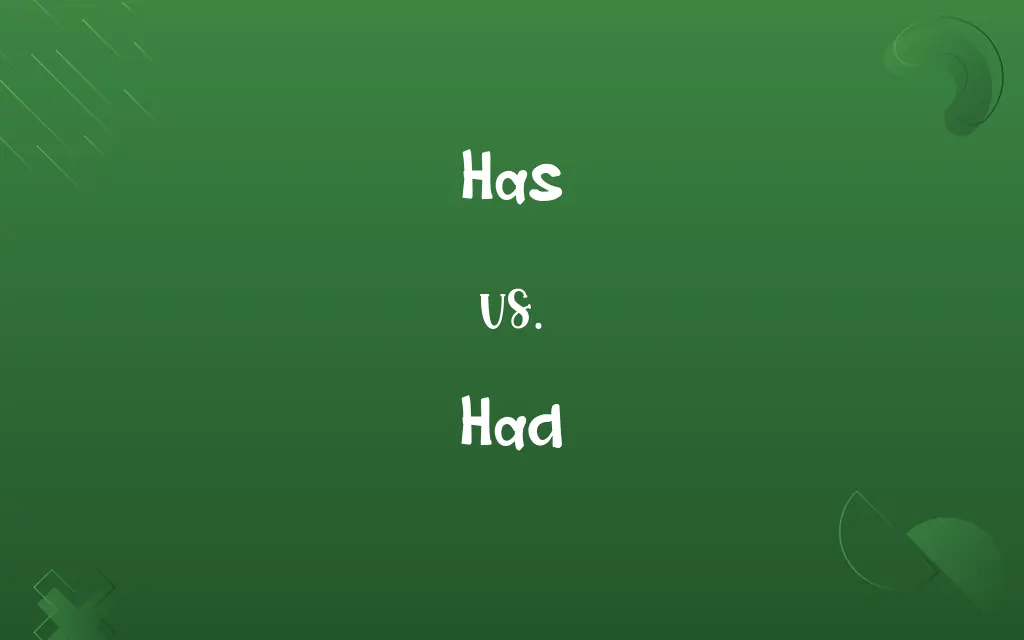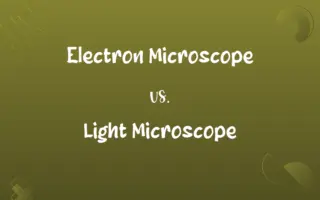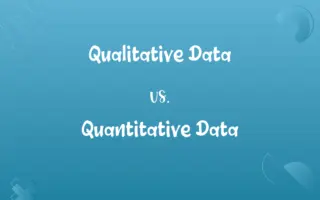Has vs. Had: Know the Difference

By Shumaila Saeed || Updated on December 25, 2023
"Has" is the present tense form of "have" for third-person singular, indicating possession or necessity, whereas "Had" is the past tense and past participle form, used for past possession or action.

Key Differences
"Has" is used in the present tense with he, she, or it to denote possession or the existence of something. For example, "She has a car." On the other hand, "Had" is the past tense and past participle form of "have," used to express possession, necessity, or action in the past, as in "She had a car."
Shumaila Saeed
Dec 20, 2023
"Has" is also used to form the present perfect tense, indicating an action that started in the past and continues in the present, like "He has lived here for years." Conversely, "Had" is used in the past perfect tense to show that an action was completed before another in the past, such as "He had lived here for years before moving."
Shumaila Saeed
Dec 20, 2023
In terms of auxiliary usage, "Has" helps form questions and negatives in the present perfect, like "Has she arrived?" In contrast, "Had" as an auxiliary is used in the past perfect, for instance, "Had she arrived before the meeting started?"
Shumaila Saeed
Dec 20, 2023
"Has" can also imply obligation in the present, as in "She has to go now." Whereas "Had" in its past form can express past obligations or recommendations, for example, "She had to go earlier."
Shumaila Saeed
Dec 20, 2023
"Has" is often used in present tense statements about habitual actions, like "He has breakfast at 8 AM." In contrast, "Had" can indicate past habits or states, as in "He had breakfast at 8 AM when he was a child."
Shumaila Saeed
Dec 20, 2023
ADVERTISEMENT
Comparison Chart
Usage
Indicates present possession or action
Indicates past possession or action
Shumaila Saeed
Dec 20, 2023
Expressing Obligation
Present obligation (e.g., has to)
Past obligation or recommendation (e.g., had to)
Shumaila Saeed
Dec 20, 2023
ADVERTISEMENT
Has and Had Definitions
ADVERTISEMENT
Had
Simple past tense and past participle of have|cap=1.
This morning I had an egg for breakfast.
A good time was had by all.
Shumaila Saeed
Dec 10, 2023
Had
Used to form the past perfect tense, expressing an action that took place prior to a reference point that is itself in the past.
I felt sure that I had seen him before.
Shumaila Saeed
Dec 10, 2023
Had
See Have.
And lever me is be pore and trewe.[And more agreeable to me it is to be poor and true.]
Him had been lever to be syke.[To him it had been preferable to be sick.]
For him was lever have at his bed's headTwenty bookes, clad in black or red, . . . Than robes rich, or fithel, or gay sawtrie.
Poor lady, she were better love a dream.
You were best hang yourself.
Me rather had my heart might feel your loveThan my unpleased eye see your courtesy.
I hadde levere than my scherte,That ye hadde rad his legende, as have I.
I had as lief not be as live to beIn awe of such a thing as I myself.
I had rather be a dog and bay the moon,Than such a Roman.
I had rather be a doorkeeper in the house of my God, than to dwell in the tents of wickedness.
Shumaila Saeed
Dec 10, 2023
Repeatedly Asked Queries
Can "Had" indicate a past habit?
Yes, "Had" can be used to talk about past habits or routines.
Shumaila Saeed
Dec 20, 2023
Does "Has" imply current possession?
Yes, "Has" typically indicates current possession or state.
Shumaila Saeed
Dec 20, 2023
Is "Had" used in forming the past perfect tense?
Yes, "Had" is used as an auxiliary verb in the past perfect tense.
Shumaila Saeed
Dec 20, 2023
Is "Has" only used in the present tense?
Yes, "Has" is used in the present tense for third-person singular.
Shumaila Saeed
Dec 20, 2023
Does "Has" form the present perfect tense for all subjects?
No, "Has" forms the present perfect only for third-person singular subjects.
Shumaila Saeed
Dec 20, 2023
Is "Has" used with plural subjects?
No, "Has" is used with singular third-person subjects only.
Shumaila Saeed
Dec 20, 2023
Is "Had" used in questions and negatives in past perfect?
Yes, "Had" is used in forming questions and negatives in the past perfect.
Shumaila Saeed
Dec 20, 2023
Can "Had" be replaced with "has" in past tense sentences?
No, "Had" cannot be replaced with "has" in past tense sentences.
Shumaila Saeed
Dec 20, 2023
Can "Has" express obligation?
Yes, "Has" can express present obligations, as in "has to."
Shumaila Saeed
Dec 20, 2023
Can "Had" imply necessity in the past?
Yes, "Had" can express past necessity or obligation.
Shumaila Saeed
Dec 20, 2023
Is "Had" used in conditional sentences?
Yes, "Had" can be used in conditional sentences, especially in the third conditional.
Shumaila Saeed
Dec 20, 2023
Does "Had" have different meanings based on context?
Yes, "Had" can have different meanings based on its use as a main verb or auxiliary.
Shumaila Saeed
Dec 20, 2023
Does "Had" ever function as a modal verb?
No, "Had" doesn't function as a modal verb; it's a past tense form of "have."
Shumaila Saeed
Dec 20, 2023
Can "Has" be used in interrogative sentences?
Yes, "Has" is used in interrogative sentences in the present perfect tense.
Shumaila Saeed
Dec 20, 2023
Is "Has" used with "he," "she," and "it"?
Yes, "Has" is used with third-person singular subjects like "he," "she," and "it."
Shumaila Saeed
Dec 20, 2023
Is "Has" appropriate for formal writing?
Yes, "Has" is suitable for both formal and informal contexts.
Shumaila Saeed
Dec 20, 2023
Does "Has" change form based on the subject?
No, "Has" remains the same for all third-person singular subjects.
Shumaila Saeed
Dec 20, 2023
Can "Has" indicate a repeated or habitual action?
Yes, "Has" can indicate a habitual action in the present tense.
Shumaila Saeed
Dec 20, 2023
Does "Had" always indicate past actions?
Yes, "Had" is primarily used to talk about actions or states in the past.
Shumaila Saeed
Dec 20, 2023
Can "Had" be used in a subjunctive mood?
Yes, "Had" can be used in the subjunctive mood, especially in expressions like "Had I known..."
Shumaila Saeed
Dec 20, 2023
Share this page
Link for your blog / website
HTML
Link to share via messenger
About Author
Written by
Shumaila SaeedShumaila Saeed, an expert content creator with 6 years of experience, specializes in distilling complex topics into easily digestible comparisons, shining a light on the nuances that both inform and educate readers with clarity and accuracy.









































































